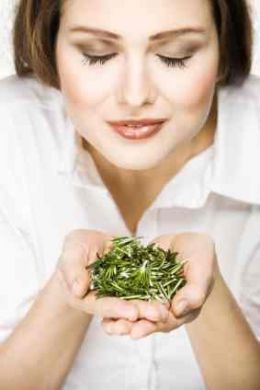Yes it’s true…sniffing rosemary could boost your brain power, scientists have suggested.
Tests show that cognitive performance improves when a compound in the herb’s oil – 1, 8-cineole – is absorbed into blood.
Biochemists at the University of Northumbria now want to see how the ingredient might affect our brains.

It has long been thought to boost brain power, so scientists were not totally surprised that respondents performed better in tests.
However, they were shocked when they realised the rosemary oil has an effect on the blood, it was reported in the Therapeutic Advances in Psychopharmacology journal.
Dr Mark Moss said: ‘We were not surprised by the improvement in cognitive performance following exposure to rosemary aroma as this has been demonstrated previously.
‘What excited us was the demonstration that performance was linked to plasma levels of 1,8-cineole following exposure.’
Tests on 20 people showed the natural compound was absorbed through the nose and into the blood plasma.
For Dr Moss, this means there is a more traditional biochemical explanation for the increased cognitive performances previously demonstrated.
‘This compound is present in rosemary but has not previously been demonstrated to be absorbed into blood plasma in humans,’ he added.
‘It is our view that the aroma therefore acts like a therapeutic drug, rather than any effects being a result of the more sensory properties of the aroma.’
Moss reminds that it’s easy to forget how many of our therapeutic drugs are the result of plant science.
His team will continue to investigate the therapeutic benefits of several common plants, including peppermint and lavender.
The potential benefits of the research are wide-ranging.
‘Plants are very complex organisms and contain many different active compounds and these vary in concentration from plant to plant and even within the same plant over the course of a day,’ Dr Moss said.
‘The accumulation of knowledge regarding possible impacts of plant aromas and extracts could potentially lead to an identification of the best combination to promote specific effects.’
‘At its grandest conclusion might be the development of plant-based drugs that might extend mental capacity into old age through pharmacological challenge to decline,’ Moss concludes.
by David Livingstone

